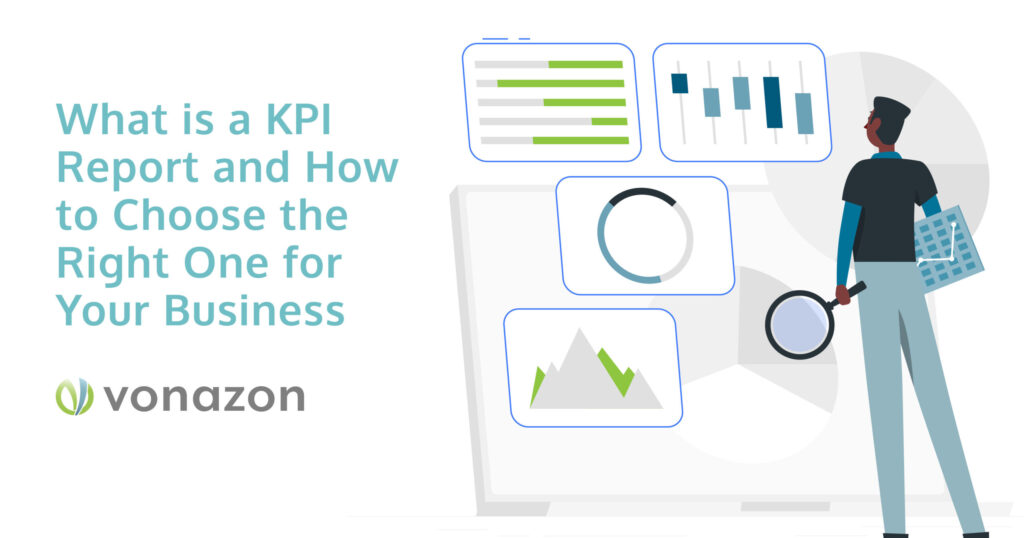What is a KPI Report and How To Choose the Right One for Your Business
It’s difficult to measure how your business is doing without specific metrics. Key Performance Indicators (KPI) help ensure your company’s long-term success by quantifying it. They serve as a framework for evaluating your progress and identifying the areas where you need to improve. You’ll need a KPI report to review and analyze your KPIs quickly and easily. They allow you to see where your business stands in relation to the strategic objectives you set. A good KPI report is also intuitive, allowing even non-technical users to understand the data’s trends, relationships, and insights.
We’ll go over what a KPI report is, why it’s important to your company’s success, how to use SMART goals to build your KPIs, and much more in this post.
What are KPIs?
Every company has objectives. KPIs, also known as strategic measures, are measurable values used to track progress toward these goals. In this sense, a KPI is a metric that helps you understand how your company is performing relating to its goals. Effective KPIs are actionable, critical, and easily communicated across the organization.
What Is The Difference Between KPIs vs Metrics
Metrics and KPIs are often used interchangeably, but there is a distinction to be made. Although a KPI is technically a metric, it provides critical insight into what your company is doing and whether it’s helping to achieve your long-term goals.
Alternatively, metrics, while still useful to your company, include data that isn’t business-critical. They’re your standard data points that can exist without being linked to any goals or targets.
What is a KPI Report?
If you’ve been in business for any length of time, you’re well aware of the massive amounts of data you generate daily. This information could include the number of visitors to your website, the number of products sold, and any other information relevant to your operations.
KPI reports will help you sort through this massive amount of information. They make data processing more manageable and useful.
Depending on the type of data, you’ll use reporting tools to display and track your KPIs using charts, graphics, and tables.
A KPI Report is not only an efficient way to collect this information, but it also visualizes KPIs and metrics in a clear and understandable manner.
Why a KPI Report is Important
KPI reports provide a reliable framework for communicating the company’s goals and the progress being made towards them. Sharing information with simple graphical elements like charts and tables has several advantages. Two of the main ones are:
- KPI reports provide a single, transparent view of performance, which is ideal for gaining employee, client, or stakeholder trust.
- Everyone involved in an objective’s outcome can see how they contributed to its success.
How to Define a KPI
Defining key performance indicators can be tricky, but asking the following questions can set you on the right path:
- What exactly is the desired outcome?
- What is the significance of this outcome?
- What metrics will you use to evaluate your progress?
- How can you help achieve this outcome?
- Is the KPI relevant to your goal?
- How frequently will you evaluate your progress toward your goal?
Creating Effective KPIs with SMART Goals
You can use the SMART approach to evaluate your team’s goals as you go through the process of setting them. SMART is an acronym that stands for Specific, Measurable, Attainable, Relevant, and Time-bound. Each of these criteria can help in the development of strategic goals and the enhancement of business performance.
When you combine smart goals with KPIs, you’ll have the direction and tools you need to stay on track.
Specific
The more specific a goal is, the more likely it is that you will take steps to achieve it. The same is true for your KPIs. Instead of “increase revenue,” you can try “sell 500 more products this month.” Take note of how the latter gives you a specific metric to achieve (500 products as well as a specific timeframe to achieve it in(a month).
Measurable
A measurable KPI allows you to track your progress and determine whether you’re on your way to meeting your goals. “Over 80% of customers reported that they are “very” or “extremely” satisfied,” for example. You can assess this by conducting surveys that provide you with the information you need to calculate the percentage.
Attainable
Long-term goals must be balanced with attainable short-term goals, just like everything else in life. Examine the current situation and adjust your goals to be more realistic in light of it. If your company’s website traffic is growing at 5% per month, you shouldn’t set a target of 20% growth. 7% or even 10% are more attainable, short-term goals.
Relevant
Perhaps you want to do something good for the environment, create a globally recognized brand, or foster a positive company culture. The KPIs you set for your company should be related to whatever your goal is.
Time-bound
Finally, if your goals don’t include a deadline, you’re less likely to stick to them. The same can be said for KPIs. To stay on track, you should include milestones in your KPIs.
Conclusion
A key performance indicator (KPI) is a measurable value that demonstrates how well your company is meeting key business objectives. And KPI reporting is how you make sense of these numbers and evaluate them in a visually appealing and intuitive manner.
Finally, when you combine KPIs with SMART goals, you’ll have the guidance and tools you need to stay on track and propel your business forward.
Need help solidifying KPIs for your business? Vonazon can help. Connect with our marketing specialists today for more information.
Account Executive
Vonazon Inc.

Vonazon can guide you through the process of creating fun and effective short form videos that are unique to your brand. We can also help you create campaigns around your videos that deliver results, grow your brand’s social media presence, and produce more leads.
Contact us today to begin your short form video journey.








